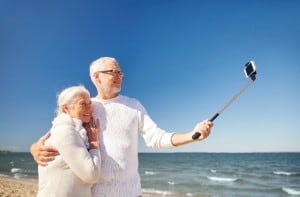Travel needn’t stop because you are now a senior. According to many senior adventurers, “Age only matters if you’re a cheese.” Yes, it does mean that you probably can’t travel the way you used to. Maybe, you have physical limitations that need to be worked around. These can be very simply addressed. Also, as an older traveler, you are a prime target for a thief’s hit list. Fortunately, there are steps you can take to protect yourself and your belongings.
We’ve put together a list that includes some tips from AARP.
- Get insurance. Because older travelers are more at risk of falling and hurting themselves, getting sick, or needing extra medications if travel plans are interrupted or delayed, travel insurance is essential.
- Don’t advertise your absence. For example, don’t hang the “clean my room” sign on your hotel door. This is an open invitation to thieves who know that they will find money, jewelry, and passports unguarded in that room. Instead, call the front desk and let them know that you are leaving the room and that it can be cleaned. Other safety measures are (a) always engage the safety chain when you are in the room, (b) always ask for a room near the elevator (more foot traffic discourages thieves), (c) never book a ground floor room which could have easy access through a window.
- Watch what you eat. Older adults tend to have more sensitive tummies and are often on restricted diets. Keep away from eating heavy, spicy, or cheesy items. Also, remain aware of any medications that don’t interact well with food. For instance, if you are on an ACE inhibitor you don’t want to eat any bananas. It is recommended to alert your doctor to your travel plans and ask him if any of the foods that are popular in your destination are foods that are off limit to you because of your meds.
- Mind your meds. Speaking of your medications, it is recommended that you take as much care with your meds as you do with your money and passports. Don’t pack them in checked luggage, and don’t leave them in plain view in your hotel room. Lastly, always make sure that you have enough for an extra day or two just in case your flight home is delayed. Make a list of the essential medications and their dosages so that you can replace them, if necessary. If you want to take it one step further, find out the name of the medication in the language of your destination country.
- Keep the bling to a minimum. Good jewelry, gold watches and fancy cameras make you a target for thieves. We recommend leaving the bling at home. Remember, a smartphone takes very good pictures these days.
- Keep others in the loop. This not only means your family at home but also your innkeeper or hotel concierge. Make sure they know your schedule including when you expect to be back; then stick to your schedule, and keep a cell phone with you at all times.
- Stay safe on your feet. Of course, wearing comfortable shoes will get you through a day of walking and touring, but they will also help you to remain steady on your feet. This is especially important if you have balance issues. Your shoes don’t have to be ugly, they just have to be flat.
Bon Voyage!

